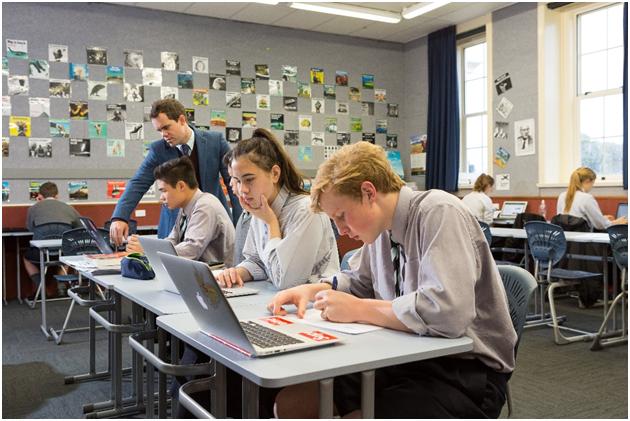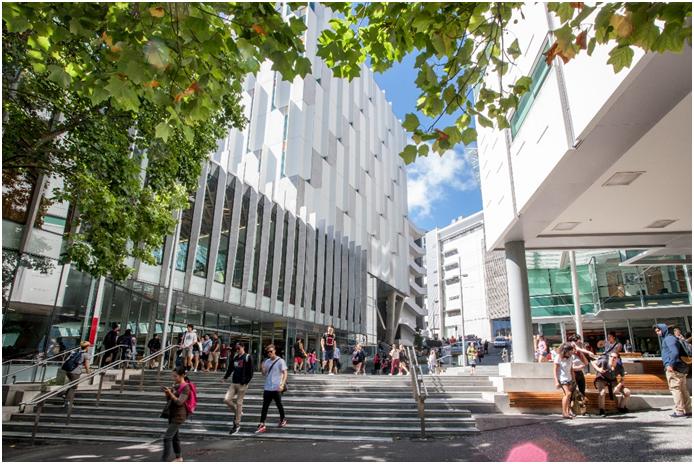Education New Zealand posts great successes in 2017
This is the result of continuous innovations in its education system, recognised by the Economist Intelligence Unit, which ranked New Zealand first in the world in its 2017 Educating for the Future Index.
The educational collaborations between Vietnam and New Zealand have also been boosted with various institutional and governmental joint programmes. Notably, today, Education New Zealand also recognised the latest 30 recipients of the New Zealand-ASEAN Scholarship (NZAS) Awards.
According to John Laxon, Education New Zealand’s regional director of South, South East Asia and the Middle East, New Zealand’s innovative teaching approach and internationally-recognised qualifications are key reasons behind the growth of international student numbers in New Zealand.
“The 2018 QS World University Rankings revealed that all eight New Zealand universities rank in the top 450 worldwide. More recently, the Economist Intelligence Unit’s 2017 Educating for the Future Index, ranked New Zealand as the best education system overall, outstripping more well-known competitors such as the US, Australia, and the UK.”
 |
| New Zealand has ranked 1st of the world in Educating for Future |
“Our education system earned full marks across a range of indices such as curriculum framework for future skills, collaboration between education providers and the industry, as well as cultural diversity and tolerance. What this means is that through an education in New Zealand, students can acquire the theoretical and practical skills, as well as the global perspectives needed to succeed in today’s interconnected workplace,” shared Laxon.
Such focused efforts have also resulted in several New Zealand universities being included in the QS Graduate Employability Rankings 2017 list, which ranks 300 leading global institutions based on five key aspects of graduate employability.
“Vietnamese students and their families are increasingly choosing New Zealand universities and secondary schools for a world-class education that prepares students for a successful global career. We have seen a 67 per cent increase in the numbers of Vietnamese students choosing New Zealand universities in 2017, and our secondary schools received 75 per cent more first-time Vietnamese students. We look forward to welcoming more Vietnamese students in 2018, and will be launching several exciting promotional initiatives in the coming months,” he added.
The impressive achievements in education quality, together with numerous partnerships between education institutes as well as bilateral governments, have contributed greatly to the significant growth of Vietnamese students to New Zealand.
In the public sector, the annual NZAS scholarships are provided by the New Zealand government and will see 30 Vietnamese scholars begin their postgraduate studies in New Zealand next month. The recipients will receive full academic scholarships, financial assistance with research and thesis costs, as well as living allowances.
Since its inception in 1994, the NZAS scholarship programme has seen over 250 Vietnamese students pursue their postgraduate education in the South Pacific nation. However, it is only one of the numerous tie-ups between education institutes in the two countries.
“The ASEAN scholarship is an example of how education partnerships give Vietnamese students the opportunity to leverage New Zealand’s expertise in niche areas to develop skills that can help them contribute to their communities,” said Laxon.
“The educational experience in New Zealand has not only given me skills to progress my career but also provided broader perspective on global issues. It has shaped my mindset positively to get ready for the local challenges back home,” said Doan Thanh Hai, one of the NZAS’ alumni, currently a project manager of Centre for Social Initiatives Promotion (CSIP), a Vietnam-based NGO supporting social enterprises and social innovation, and business development officer of IBE, a social enterprise founded by CSIP.
The other highlight in the intergovernmental partnership is the English Language Training for Officials to offer a 22-week English training course for Vietnamese state officials in New Zealand. This year, the programme welcomes 10 officials.
Furthermore, 2017 also sees a number of new partnerships between New Zealand institutions and their Vietnamese counterparts, which help enrich the existing educational partnerships that many New Zealand and Vietnamese institutions have been establishing for many years.
 |
| Educational collaborations between the two countries have also been growing stronger |
These include the Memorandum of Understanding between University of Waikato and People’s Security Academy of Vietnam, which resulted in undergraduate and postgraduate training programmes in areas such as cyber security, law, computer science, and environmental security.
Meanwhile, other institutes such as Nelson Marlborough Institute of Technology and Victoria University of Wellington have signed MOUs on joint programmes and accreditations with Hong Bang University and Ho Chi Minh City University of Natural Science.
2017 also marked the 10-year anniversary of the joint programme between Auckland University of Technology (AUT) and Ho Chi Minh City University of Natural Science for their joint Bachelor of Computer Science programme.
Laxon noted that these collaborations reiterate New Zealand universities’ commitment to providing Vietnamese students with access to high-quality tertiary qualifications within a holistic learning environment.
| Education New Zealand celebrates one million followers with $7,320 scholarship For a limited time only, Education New Zealand (ENZ) is offering a NZ$10,000 ($7,320) scholarship for a current or prospective international student. |
| New Zealand: outstanding education opportunity On May 25, 2017, Education New Zealand held a media meeting at the home of New Zealand Ambassador Wendy Matthews to provide an overview of the advanced education opportunities for Vietnamese students in New Zealand. |
What the stars mean:
★ Poor ★ ★ Promising ★★★ Good ★★★★ Very good ★★★★★ Exceptional
Latest News
More News
- Vietnam Television launches third 'Song Sau Lu' project for 2025 (December 15, 2025 | 08:00)
- Closing workshop highlights five-year impact of Fair for All project (December 12, 2025 | 16:22)
- Stakeholders mobilised before new child safety rules take effect (December 10, 2025 | 09:00)
- Vietnam receives emergency international relief as regional flooding intensifies (December 04, 2025 | 15:11)
- AmCham scholarships awarded to students (December 02, 2025 | 16:46)
- Vietjet flights carry love to devastated central region (November 28, 2025 | 11:35)
- SCG Sharing the Dream supports Vietnam’s youth and sustainable development goals (November 28, 2025 | 10:55)
- Siemens Caring Hands donates $34,700 for disaster relief in Vietnam (November 26, 2025 | 20:25)
- Ireland extends support for the Resilience First initiative (November 26, 2025 | 15:24)
- South Korea funds IOM relief for Vietnam’s typhoon-affected communities (November 24, 2025 | 15:33)


















 Mobile Version
Mobile Version